American soldiers returning home from Vietnam often faced scorn as the war they had fought in became increasingly unpopular.
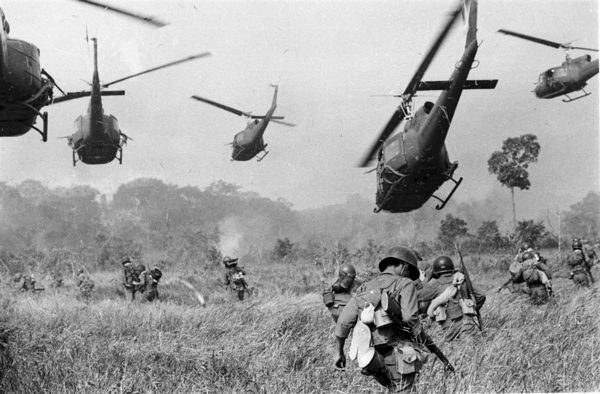
I had gotten this article from “CherrieWriters”, It was one of the sites I get regular emails from. The site is full of information about Vietnam. I found the site years ago when I was researching the A-7 strikes near Hanoi if memory servers. This article means something to me because I remember the treatment my Dad got when he came home from his 2nd tour in Vietnam and it infuriated me, I was too young to really remember his first tour. How could the people blame the G.I’s for the war, they had to go when their government sent them. Going to Canada was a non-starter for most of the draftee’s, “only cowards and cocksuckers ran to Canada” was the prevailing theme. Then the way they were crapped on after they returned, from the people on the streets to the VA and the government. I recall the sentiment during Desert Storm that we were massively supported by the people on the street to Hollywood celebrities. It was almost surreal compared to the treatment my Dad and his generation got. I am glad that we as a society has matured, even during the unpopularity of the Iraq war most people didn’t blame the G.I. although there were a few asshats here and there. ~ Mr. Garabaldi
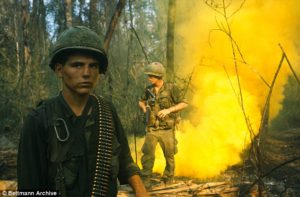
Twenty-one-year-old Steven A. Wowwk arrived as an infantryman in the Army’s First Cavalry Division in Cam Ranh Bay, Vietnam in early January 1969 to fight in an escalating and increasingly unwinnable war. By June, Wowwk had been wounded twice – the second time seriously – and was sent back to the United States for treatment at Boston’s Chelsea Naval Hospital.
It was after returning to the U.S. and while en route to the hospital that Wowwk first encountered hostility as a veteran.
Strapped to a gurney in a retrofitted bus, Wowwk and other wounded servicemen felt excitement at being back on American soil. But looking out the window and seeing civilians stop to watch the small convoy of hospital-bound vehicles, his excitement turned to confusion. “I remember feeling like, what could I do to acknowledge them, and I just gave the peace signal,” Wowwk says. “And instead of getting return peace fingers, I got the middle finger.”
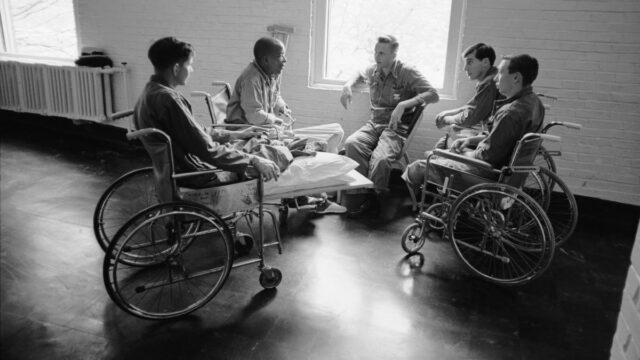
A group of amputee Vietnam veterans talk together at a hospital in San Francisco, California, 1967. – Bill Ray/Time & Life Pictures/Getty Images
The Vietnam War claimed the lives of more than 58,000 American service members and wounded more than 150,000. And for the men who served in Vietnam and survived unspeakable horrors, coming home offered its own kind of trauma. Some, like Wowwk, say they had invectives hurled their way; others, like naval officer Ford Cole, remember being spit on. As a cohort, Vietnam veterans were met with none of the fanfare and received none of the benefits bestowed upon World War II’s “greatest generation.”
No ‘Welcome Home’ parades for Vietnam vets
This was partly due to the logistics of the never-ending conflict. The Vietnam War lasted from 1964-1973—the longest war in American history until it was overtaken by the one in Afghanistan – and servicemen typically did one-year tours of duty. Unlike conflicts with massive demobilizations, men came back from Vietnam by themselves rather than with their units or companies. For a decade, as one person was shipped off to fight, another was returning.
“The collective emotion of the country was divided,” says Jerry Lembke, a Vietnam veteran, sociologist and author of The Spitting Image: Myth, Memory, and the Legacy of Vietnam. “For the family whose son is just coming back, you aren’t going to have a public welcoming home ceremony when someone’s son just down the road was just sent off to Vietnam.”
As the war ground on and became increasingly hopeless, the military personnel put through this kind of revolving door of service came to represent something many Americans would rather not accept: defeat. “Vietnam was a lost war, and it was the first major lost war abroad in American history,” Lembcke says. “You don’t have parades for soldiers coming home from a war they lost.”
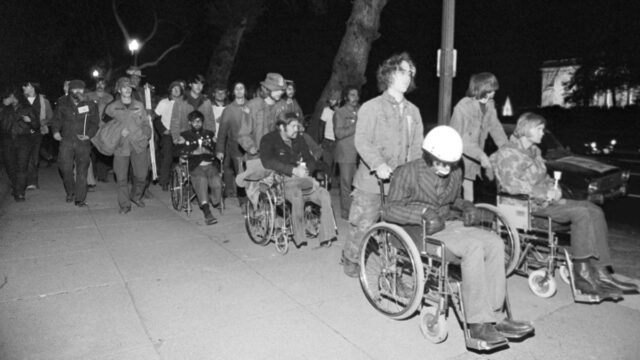
Vietnam veterans hold a silent march down Pennsylvania Avenue past the White House here on April 22, 1971. Bettmann Archive/Getty Images
GI benefits were lacking
Celebrations aside, the government also failed to make good on its promises to those who served. Veterans returning from Vietnam were met with an institutional response marked by indifference. Peter Langenus, today the Commander of VFW Post 653 in New Canaan, Connecticut, commanded Delta Company, 3rd Battalion/7th Infantry, 199th Light Infantry Brigade from 1969-70. He led his men on operations that lasted 30 days or more in some of Vietnam’s most inhospitable conditions, “without shaving, bathing or changing clothing. None of that,” he says, “prepared me for the reception at home upon our return.”
Back in the States, Langenus quickly discovered the GI benefits available for Vietnam veterans “were almost nonexistent.” While living in New York, he developed symptoms of malaria – a tropical disease fairly uncommon in the concrete jungle – yet he was denied VA health care because he didn’t display those symptoms in Vietnam. He graduated from Notre Dame prior to being commissioned, and after his service returned to law school to cash in his educational benefits. “At a time when I was paying $300 a credit, my entire educational benefit was $126.” And when it came to finding a job, he was met with thinly veiled disgust and discrimination from law firms upon learning he was a Vietnam infantry veteran.
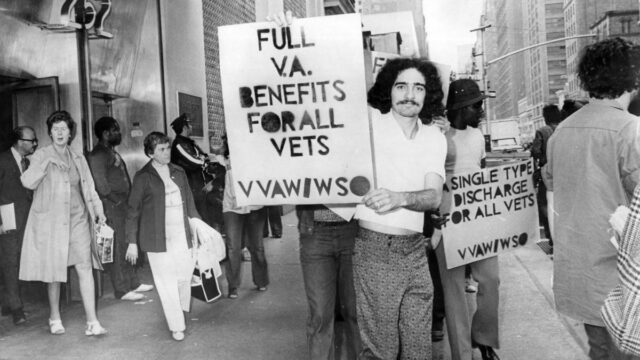
Protestors demonstrate for full benefits for all US veterans, including Vietnam War veterans in July, 1974. Jerry Engel/New York Post Archives/NYP Holdings, Inc./Getty Images
“The society really was ill-prepared to give these guys what they deserved,” says Christian Appy, professor of History at the University of Massachusetts Amherst and author of three books on Vietnam. “They were not necessarily looking for a parade, but they were certainly looking for basic human support and help in readjusting to civilian life after this really brutal war.”
Part of the reason was economic. While the economy after World War II was one of the most robust in American history, during and after Vietnam the nation was in a death spiral of stagflation and economic malaise. And as more and more wartime atrocities came to light, there was a national implication of guilt and shame placed on Vietnam veterans as participants in and avatars of a brutal, unsuccessful war. In popular culture, the stereotype of the broken, homeless Vietnam vet began to take hold thanks to films like The Deer Hunter (1978), Coming Home (1978) and First Blood (1982).
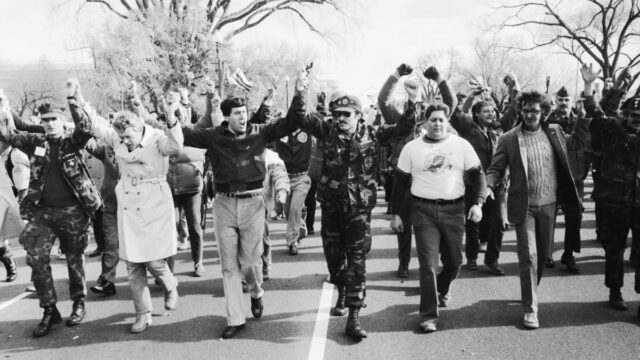
In 1982 Vietnam veterans march down Constitution Avenue toward the Vietnam Veterans Memorial, which would be dedicated later that day. Wally McNamee/Corbis/Getty Images
The Gulf War saw a shift in attitudes
It would take nearly 20 years after the end of the war for America to get right with its Vietnam veterans. The dedication of the Vietnam Veterans Memorial in 1982 began the process, but many identify the Gulf War of 1990-91 – with its national flag-waving, yellow-ribbon cultural mobilization and the grand celebrations of a successful campaign – as ending Vietnam Syndrome. “The Vietnam veterans, we couldn’t believe it. We could not understand getting letters from school kids,” says Langenus, also a veteran of Desert Storm. “You couldn’t believe that people were cheering you.”
Since 9/11, patriotic gestures, like wearing flag pins and saying, “Thank you for your service,” have become common, as more troops are sent to Iraq and Afghanistan. But the specter of Vietnam still lingers, and some of that war’s veterans view such acts with a wary glance.
“Deeds need to be done in addition to words,” says Wowwk, who is 100 percent disabled from his Vietnam wounds. “I appreciate the respect of ‘thank you’ because that was something I never received when I came home. It’s better than nothing. It’s better than them walking away and not even recognizing you. But what are you doing in addition to saying ‘thank you’?”
~ Comment ~
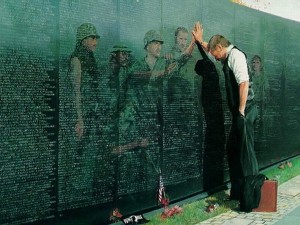 I am a Vietnam Vet. Some negative things that occurred to me are:
I am a Vietnam Vet. Some negative things that occurred to me are:
I visited San Francisco prior to my departure. While there, I was to wear my uniform when traveling. Two times when in uniform, bypasses would yell “Baby Killer”. As of today I look forward to California sinking into the ocean. When I returned I got off the train and walked to by home on Long Island, on the way there, I was stopped and interrogated by the local police of why I was there and were I was going, even after showing my military ID. They knew and still persisted. At the local VFW event, I was blamed for loosing the war. Well yes I guess it was my fault. Even today, I will not attend any local veteran event. They can kiss my ass. Lastly is the look young people give me when I tell them I was in Nam. Thanks to the movies and media, I am a deranged baby killer and at anytime, my PTSD (of which I have) will kick in and I will kill everyone. Strange, that as of today I am a nurse, who live only to help others. But lets also talk about the positive: The VA helped me, they educated me, they gave me support for my PTSD. My family loves and supports me.
My fellow veterans are still here, and yes unlike some others or MSM talking points we support each other, yes we would do it again if called. 58,000 Americans died, another 10 million or so, in their minds are still there. After I came back there was a feeling that America is the land of vanilla ice cream. I still am looking for thing to keep me alive. Oh, yes one thing was voting for Trump.
Sgt. Pete
January 17, 2020
Written by Dante A. Ciampaglia for History ~ March 29, 2019

